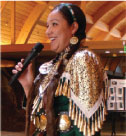6650 E. Broadway • Mt. Pleasant, MI 48858
Phone: 989-775-4750 • Fax: 989-775-4770
Hours Of Operation

Cultural Presenters Program

Topic specific presentations may be added to your Ziibiwing Center experience or booked
for an offsite learning experience.
CULTURE & LIFEWAYS

Wiisagaak Kokibinaaganan (Black Ash Baskets): Discover the art of Black Ash basketry during this cultural presentation. Participants will learn about the identification, pounding, splitting, and dying processes to produce the splint materials, plus the tools used. They will see examples of different weaves and baskets. They will hear stories about community members who are basket makers and the important role basket making plays. They will hear the story of the Black Ash tree that explains the tree's origin. They will also learn about the Emerald Ash Borer that poses a threat to the Black Ash tree, and what measures Tribal communities are taking to help save the Black Ash tree and preserve this way of life.
Dikinaagan (Cradleboard): The Anishinabek believe children are gifts from the Creator to be respected, guided, and loved. Families create beautiful cradleboards (dikinaaganan) for their babies (abinoojiinsag). Learn about these beautiful works of arts and the role they play in our community. Learn of their construction, how & why they are used, and how this knowledge is carried forward to the next generation.
Medicine Wheel: The medicine wheel promotes harmony and balance in our lives. It represents how the Anishinabek see the world as a circle in which everything on this Earth has its place. Learn about the Anishinabe Medicine Wheel, its components, and teachings associated with its significance.
Ojibwe Music: Learn about both the traditional and modern ways in which the Anishinabe people include music into their lives. Music is present in ceremonies, celebrations, and our daily lives, as well as for specific reasons or events. Traditional songs that have been passed down for many generations are present in contemporary life, as well as new songs and styles of music.
Bi Mosem Makazining (Take A Walk In Our Shoes) - Anishinabek Moccasin History: What can you learn by looking at a person's footwear? Learn about the traditional footwear of the Anishinabek of the Great Lakes as you walk through history with us. The design of our footwear was and continues to be influenced by our knowledge of Mother Earth, the resources available to us, and contact with other cultures.

Pow Wow & Dance Styles: Contemporary North American Indian Pow Wows and dance styles have their roots in older traditions from a number of different tribes. Learn about the history of North American Indian Pow Wows as well as the contemporary gatherings still held today. The importance of the drum, songs, and dances are also discussed.
HISTORY/GOVERNMENT
American Indian Boarding School Era: By 1900 most American Indian children were taken from their families. They were transported by train or bus to American Indian Boarding Schools where they were forced to learn new ways of life. Learn about this difficult time of family separation, forced assimilation, and the effects that these policies had on the people living during this era, as well as the impact on future generations.
Effects of Colonization: With the colonization of the Americas by European powers there came many consequences that still effect American Indian communities today. Changes in diet and lifestyle, the introduction of new diseases, and other extreme changes for American Indian peoples are discussed. Discussion on how American Indians are still dealing with these effects in contemporary society.
Saginaw Chippewa Tribal History & Contemporary Society: Learn about the history of the people of the Saginaw Chippewa Indian Tribe of Michigan from before they were called Saginaw Chippewa, all the way to contemporary times. Information on both the current community and the diversity that defines the Tribe will be discussed.
THE NATURAL WORLD
Nigitigaaninaan (Our Plants): Before European contact, the Anishinabek had their own ways of using plants. The Anishinabek have special relationships with the plants. This valuable information has been passed down from elders to children over generations, and still perseveres today. Learn about some Anishinabe uses of plants, and how plants are viewed in a cultural context.
Manoomin (Wild Rice - Zizania palustris): Manoomin is more than just a food for the Anishinabek. It is considered a sacred gift from Gitche Manido (Creator or Great Mystery). The Anishinabek have been respectfully gathering Manoomin (wild rice) throughout the Great Lakes area for centuries. Learn about the significance of Manoomin to the Anishinabek, and about the traditional process of harvesting the rice.
Iskigamizigan (Sugarbush): Maple sugar and syrup are two of the oldest agricultural products in North America. For many generations, the Anishinabek have been harvesting ziibaakdaaboo (maple sap) during the time of year when boon (winter) gives way to mnookimi (spring). Learn about the technology of harvesting and processing maple sap to make maple sugar and syrup.
RESEARCH
Family History: Learn helpful hints on how to get started on your own family research and how to continue research once you have begun. Discover exciting historical resources to use, how to locate new information, and learn processes to best utilize and organize your data.
Cultural Presenters Program Pricing
AT ZIIBIWING CENTER: $200 for the 1st hour (per speaker + room fee)
100
per hour for every additional hour.
OFFSITE: $200 for the 1st hour (per speaker + mileage & accommodations).
$100 per hour for every additional hour.
(Minimum of $200 for standard, tribal and non-profit groups.)
Cultural Presenter Progam
Please contact our Sales & Events Coordinator at (989) 775-4744 for more information or to make reservations.
The Ziibiwing Center will accommodate requests for special presentation topics whenever possible.





